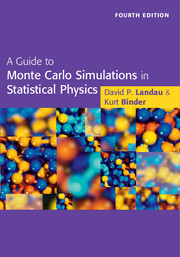Book contents
- Frontmatter
- Contents
- Preface
- 1 Introduction
- 2 Some necessary background
- 3 Simple sampling Monte Carlo methods
- 4 Importance sampling Monte Carlo methods
- 5 More on importance sampling Monte Carlo methods for lattice systems
- 6 Off-lattice models
- 7 Reweighting methods
- 8 Quantum Monte Carlo methods
- 9 Monte Carlo renormalization group methods
- 10 Non-equilibrium and irreversible processes
- 11 Lattice gauge models: a brief introduction
- 12 A brief review of other methods of computer simulation
- 13 Monte Carlo simulations at the periphery of physics and beyond
- 14 Monte Carlo studies of biological molecules
- 15 Outlook
- Appendix: Listing of programs mentioned in the text
- Index
Preface
Published online by Cambridge University Press: 05 November 2014
- Frontmatter
- Contents
- Preface
- 1 Introduction
- 2 Some necessary background
- 3 Simple sampling Monte Carlo methods
- 4 Importance sampling Monte Carlo methods
- 5 More on importance sampling Monte Carlo methods for lattice systems
- 6 Off-lattice models
- 7 Reweighting methods
- 8 Quantum Monte Carlo methods
- 9 Monte Carlo renormalization group methods
- 10 Non-equilibrium and irreversible processes
- 11 Lattice gauge models: a brief introduction
- 12 A brief review of other methods of computer simulation
- 13 Monte Carlo simulations at the periphery of physics and beyond
- 14 Monte Carlo studies of biological molecules
- 15 Outlook
- Appendix: Listing of programs mentioned in the text
- Index
Summary
Historically physics was first known as ‘natural philosophy’ and research was carried out by purely theoretical (or philosophical) investigation. True progress was obviously limited by the lack of real knowledge of whether or not a given theory really applied to nature. Eventually experimental investigation became an accepted form of research although it was always limited by the physicist's ability to prepare a sample for study or to devise techniques to probe for the desired properties. With the advent of computers it became possible to carry out simulations of models which were intractable using ‘classical’ theoretical techniques. In many cases computers have, for the first time in history, enabled physicists not only to invent new models for various aspects of nature but also to solve those same models without substantial simplification. In recent years computer power has increased quite dramatically, with access to computers becoming both easier and more common (e.g. with personal computers and workstations), and computer simulation methods have also been steadily refined. As a result computer simulations have become another way of doing physics research. They provide another perspective; in some cases simulations provide a theoretical basis for understanding experimental results, and in other instances simulations provide ‘experimental’ data with which theory may be compared. There are numerous situations in which direct comparison between analytical theory and experiment is inconclusive. For example, the theory of phase transitions in condensed matter must begin with the choice of a Hamiltonian, and it is seldom clear to what extent a particular model actually represents real material on which experiments are done. Since analytical treatments also usually require mathematical approximations whose accuracy is difficult to assess or control, one does not know whether discrepancies between theory and experiment should be attributed to shortcomings of the model, the approximations, or both. The goal of this text is to provide a basic understanding of the methods and philosophy of computer simulations research with an emphasis on problems in statistical thermodynamics as applied to condensed matter physics or materials science. There exist many other simulational problems in physics (e.g. simulating the spectral intensity reaching a detector in a scattering experiment) which are more straightforward and which will only occasionally be mentioned.
- Type
- Chapter
- Information
- A Guide to Monte Carlo Simulations in Statistical Physics , pp. xv - xviiiPublisher: Cambridge University PressPrint publication year: 2014



